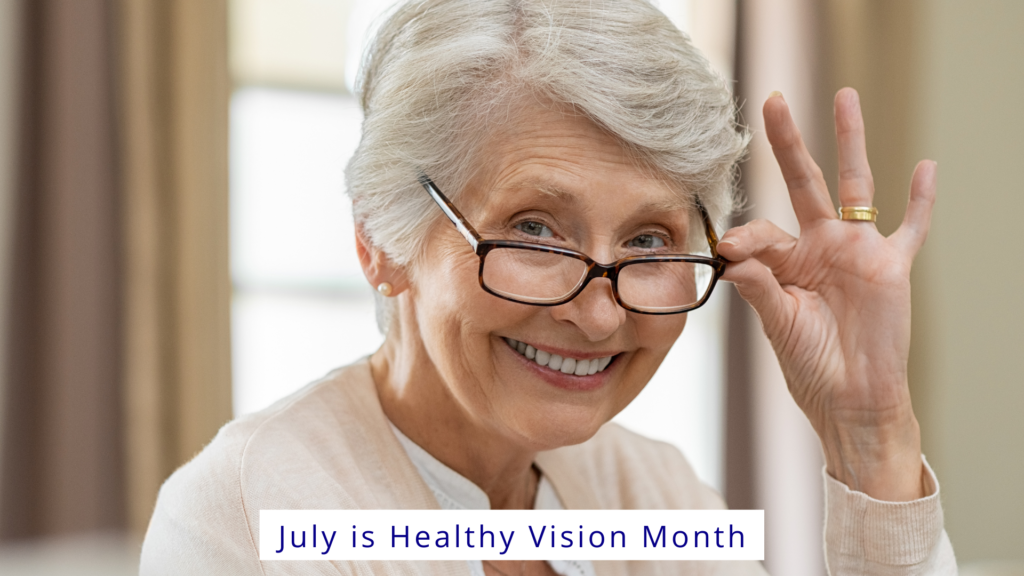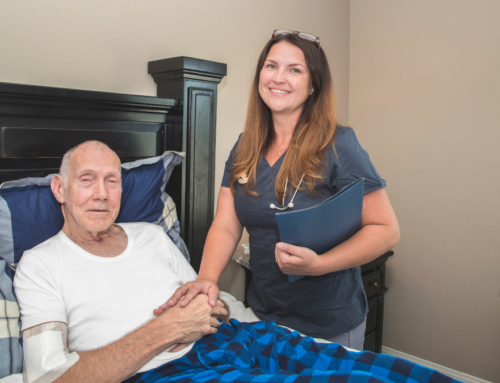 Maintaining Good Vision in Our Golden Years
Maintaining Good Vision in Our Golden Years
Every year, the National Eye Institute recognizes July as Healthy Vision Month. This year, their goal is to inspire families to team up and learn how to protect their vision together. We thought that was the perfect opportunity to offer some helpful tips for maintaining good vision as we age.
Our vision is one of our most important senses. We often take for granted just how important our vision is until we notice it declining. As we age, our vision naturally tends to deteriorate and we may start experiencing problems like cataracts, glaucoma, and macular degeneration. This can make it difficult for us to do everyday activities like reading, driving, and even recognizing people’s faces. For some people, these changes can be minor and hardly noticeable. But for others, they can be quite significant and impact daily life.
In this post, we’ll talk about the most common vision problems seniors face, what causes them, and how to get help. Keep reading for more information.
Most common vision problems of seniors
There are a number of common vision problems that seniors face as they age. These include:
Cataracts
A cataract is a clouding of the lens in the eye. It can make objects appear blurry, yellowed, or faded. Cataracts usually develop slowly and are more common in people over the age of 60.
Glaucoma
Glaucoma is a condition in which the pressure in one or both eyes increases. This can damage the optic nerve, which transmits signals from the eye to the brain. If left untreated, glaucoma can lead to blindness.
Macular degeneration
Macular degeneration is a deterioration of the macula, which is the central part of the retina. It can cause Blurry vision and make it difficult to see fine details. Macular degeneration is the leading cause of blindness in people over the age of 65.
Reasons seniors may start to experience vision problems
There are a number of reasons seniors may start to experience vision problems. These include:
Age-related changes in the eye
As we age, our eyesight naturally starts to deteriorate. This is because the structures in our eyes (e.g., the cornea, lens, and retina) begin to break down, just as other areas of our body break down as we get older.
Health conditions
Certain health conditions can also lead to vision problems in seniors. These include diabetes, high blood pressure, and cardiovascular disease.
Medications
Certain medications can cause side effects that lead to vision problems. These include certain types of diuretics, beta blockers, and anticholinergics.
Signs that vision is declining and what to do about it
Blurry vision
If objects appear blurry or fuzzy, it may be a sign that the senior’s vision has started to deteriorate.
Difficulty seeing in low light
If the senior has difficulty seeing in dim or dark lighting, it may be a sign that their vision is declining.
Trouble driving at night
If the senior has trouble seeing while driving at night, it may be a sign that their vision is not as good as it used to be.
Difficulty reading
If the senior has difficulty reading, it may be a sign that their vision is not as sharp as it used to be.
If you notice any of these signs in a senior, or any loved one, the best course of action is to take them to an eye care professional, who can diagnose and provide treatment and/or recommendations for next steps. An eye doctor can determine if the senior has a vision problem and provide treatment options.
Tips for maintaining good vision in seniors
Wear sunglasses
Wearing sunglasses can help protect the eyes from the harmful UV rays of the sun. Senior’s eyes may be more sensitive to the light, so a quality pair of sunglasses can help protect them.
Eat a healthy diet
Eating a healthy diet rich in fruits, vegetables, and omega-3 fatty acids can help improve vision. It is essential for seniors to maintain a healthy diet.
Exercise regularly
Exercising regularly can help improve circulation and maintain overall health. This is important for everyone, but especially for seniors who tend to be more sedentary as they age.
Quit smoking
Smoking can damage the eyes and lead to vision problems because it decreases blood flow to the eyes. Especially over time, the effects can be quite extensive. It’s best to quit smoking as soon as possible to give the body a chance to heal.
Get regular eye exams
It’s important for seniors to get regular eye exams so that any vision problems can be detected early and treated.
How in-home care can help seniors maintain their independence
In-home care can help seniors in a number of ways. Here are some of the ways in-home care can help seniors maintain their vision health and independence:
Help with transportation
In-home care can provide seniors with transportation to and from eye doctor appointments. They are also available to help with other errands the senior may need to run.
Assist with medication management
An in-home care provider can help seniors to manage their medications. This includes making sure they’re taking their medications as prescribed and keeping track of refill dates.
Help with healthy eating
As we mentioned above, It is essential for seniors to maintain a healthy diet. Meal planning and preparing healthy meals might be difficult for seniors with vision problems. An in-home care provider can help with this by doing the grocery shopping and even cooking for the senior.
Provide emotional support
Vision loss can be a difficult thing to deal with. In-home care providers can provide much-needed emotional support to seniors during this time.
Provide companionship
In-home care providers can provide seniors with companionship. This can help reduce feelings of isolation and loneliness, which can lead to depression.
In-home care can help seniors maintain vision health and independence for as long as possible. If you are concerned about your own or a loved one’s vision, in-home care can be a great option to help maintain health and independence. Reach out today if you have any questions about our programs. For a no-cost consultation, where we’ll discuss your specific circumstances, give us a call at (678) 494-8129 or email us at info@SilverCompanions.com. We want to help make sure your family member(s) get(s) all the attention they deserve during a time when they may not feel capable of taking care of themselves without some extra support.





